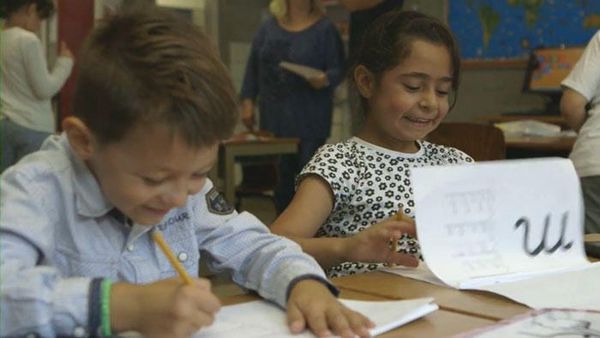Eye For Film >> Movies >> Miss Kiet's Children (2016) Film Review
Miss Kiet's Children
Reviewed by: Jennie Kermode

Every child has a lot to cope with during the early years at school. It's difficult for adults to relate to the experience of being surrounded by so much mystery, so many apparently unfathomable things, and asked to follow rules which often appear to make little more sense. For Miss Kiet's Children, this is compounded by the experience of being in a foreign country. These are refugee chldren. Some of them have seen terrible things. In her classroom in a small Dutch village, Miss Kiet attempts to restore their confidence and bring them back into a normal life.
Some of the children have already been here for a while. There's Branche, whom all the girls are smitten with - he's quiet but seems very much at ease with himself. Then there's Haya, the kind of kid who broadcasts her emotions and isn't content unless everybody else falls into line; she's very bright but struggles to find satisfaction. Some kind of opportunity seems to present itself with the arrival of the younger, much smaller Leanne, a pixie-faced child with charmingly protuberant ears. Leanne's apparent fragility brings out Haya's caring side, but perhaps too much. When the younger girl intimates that she prefers to do things by herself, Haya is confused. When she chooses to play a game with other girls, Haya appears tortured by jealousy.

Bespectacled Jorj is one of those kids who naturally unites the others, wildly imaginative as he is, full of warmth and humour. Underneath the jokes and the rebel attitude, however, he seems deeply troubled. The tricks he uses to avoid work are indicative of both intelligence and insecurity, and in one painful scene, when the other children play a game with a mirror, he reveals a deep discomfort with facing his own image. Shadowing him is his little brother Maksem, who speaks less but evidences a milder version of the same trauma. Can Jorj be persuaded to make enough effort to find out what he's capable of?
In this ostensibly simple, observational film, we plunge into the classroom as if we were new kids ourselves. There is no superimposed narrative but not only are the children's dramas a lot more involving than you might expect, we gradually come to understand Miss Kiet's technique and the way that her small interventions - many of them based on persuading the children to figure things out for themselves - have an effect. Practical help is available to any child who needs it but Miss Kiet is very careful to make her charges aware of the difference between what they really need and what thy just want. Fragile and psychically wounded as many of them are, she resists any urge to spoil them. The process of taking on responsibility seems more effective in helping them heal. When bullying occurs, she's there to be a peacemaker, and there's a focus on social learning over all other things.
Through its observations of the children, the film tells a story about the consequences of war and migration with much wider reaching import. It also pays tribute to educators worldwide who work to undo the damage and to help children recover from a range of different traumas. Free of schmaltz, it gives the children room to be their complicated selves, often as endearing in their unpleasantness as they are when being sweet. And despite the darkness underlying the situation, there's nothing here that's inappropriate for young viewers, making this a good introduction to some difficult topics.
Many viewers will wish that they'd had a teacher like Miss Kiet. In Peter Lataster and Petra Lataster-Czisch, she has found directors worthy of her story.
Reviewed on: 16 Mar 2018














